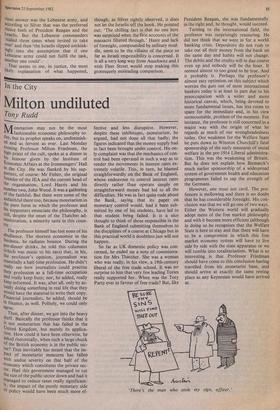In the City
Milton undiluted
To Rudd
Monetarism may not be the most fashionable economic philosophy to- day, but its prophet speaks on, undiminish- ed and as fervent as ever. Last Monday evening Professor Milton Friedman, the high priest of the cult, spoke at a dinner in his honour given by the Institute of Economic Affairs at the Ironmongers' Hall in the City. He was flanked by his sup- Porters, of course: Mr Fisher, the original founder of the lEA and the current head of the organisation, Lord Harris and his number two, John Wood. It was a gathering of the faithful. But there were some of the unfaithful there too, because monetarism in the pure form in which the professor and his supporters enunciate the philosophy, is still, despite the onset of the Thatcher ad- Ministration, a minority taste in this coun-
try,
The professor himself has lost none of his ebullience. The shortest economist in the business, he radiates bounce. During the Pre-dinner drinks, he told this columnist (Which was music to his ears) that, in his, the professor's opinion, journalism was essentially a half-time profession. He didn't really see how journalists could practise their profession as a full-time occupation and really keep busy; nor, he added, really keep informed. It was, after all, only by ac- tually doing something in real life that they would have the material to write their copy. Financial journalists, he added, should be in finance, as well. Politely, we could only agree.
Then, after dinner, we got into the heavy stuff. Basically the professor thinks that it 1,.s not monetarism that has failed in the United nited Kingdom, but merely its applica- tion. How could it have been otherwise, he asked rhetorically, when such a large chunk of the British economy is in the public sec- tor? That inevitably has meant that the im- pact of monetarist measures has fallen With undue severity on that half of the economy which constitutes the private sec- tor. Had this government managed to cut the size of the public sector down and had it Managed to reduce taxes really significant- IY, the impact of the purely monetary side of Policy would have been much more ef-
fective and less disruptive. However, despite these inhibitions, monetarism, he argued, had not done all that badly; the figures indicated that the money supply had in fact been brought under control. His on- ly complaint was that the mechanics of con- trol had been operated in such a way as to render the movements in interest rates ex- tremely volatile. This, in turn, he blamed straighforwardly on the Bank of England, whose endeavour to control interest rates directly rather than operate simply on straightforward money had led to all the difficulties. He was in fact quite rude about the Bank, saying that its paper on monetary control would, had it been sub- mitted by one of his students, have led to that student being failed. It is a nice thought to think of those responsible in the Bank of England submitting themselves to the disciplines of a course at Chicago but in this practical world it doubtless just will not happen.
So far as UK domestic policy was con- cerned, he ended on a note of commisera- tion for Mrs Thatcher. She was a woman who was really, in his view, a 19th-century liberal of the free trade school. It was no surprise to him that very few leading Tories really supported her. When was the Tory Party ever in favour of free trade? But, like President Reagan, she was fundamentally in the right and, he thought, would succeed.
Turning to the international field, the professor was surprisingly reassuring. He did not think that we were in for a world banking crisis. Depositors do not rush to take out all their money from the bank on the same day and habits will not change. The debits and the credits will in due course even up and nobody will be the loser. It seemed almost to too good to be true. And it probably is. Perhaps the professor's almost easy optimism on this subject which worries the guts out of most international bankers today is at least in part due to his preoccupation with a wider and more historical canvas, which, being devoted to more fundamental issues, has less room to spare for the immediate and, in his view surmountable, problem of the moment. For instance, the professor is still concerned in a major way with the origin of what he regards as much of our wrongheadedness today. Our weakness for the Welfare State he puts down to Winston Churchill's fatal sponsorship of the early measures of social welfare in the pre-1914 Liberal administra- tion. This was the weakening of Britain. But he does not explain how Bismarck's much earlier sponsorship of a widespread system of government health and education programmes failed to sap the strength of the Germans.
However, one must not cavil. The pro- fessore is mellowing and there is no doubt that he has considerable foresight. His con- clusion was that we will go one of two ways. Either the Western world will gradually adopt more of the free market philosophy and with it become more efficient (although in doing so he recognises that the Welfare State is here to stay and that there will have to be a compromise in which this free market economy system will have to live side by side with the state apparatus or we will tumble into totalitarianism. What is so interesting is that Professor Friedman should have come to this conclusion having travelled from his monetarist base, and should arrive at exactly the same resting place as any Keynesian would have arrived at.
`There's the man who stole my sign, officer.'


































 Previous page
Previous page